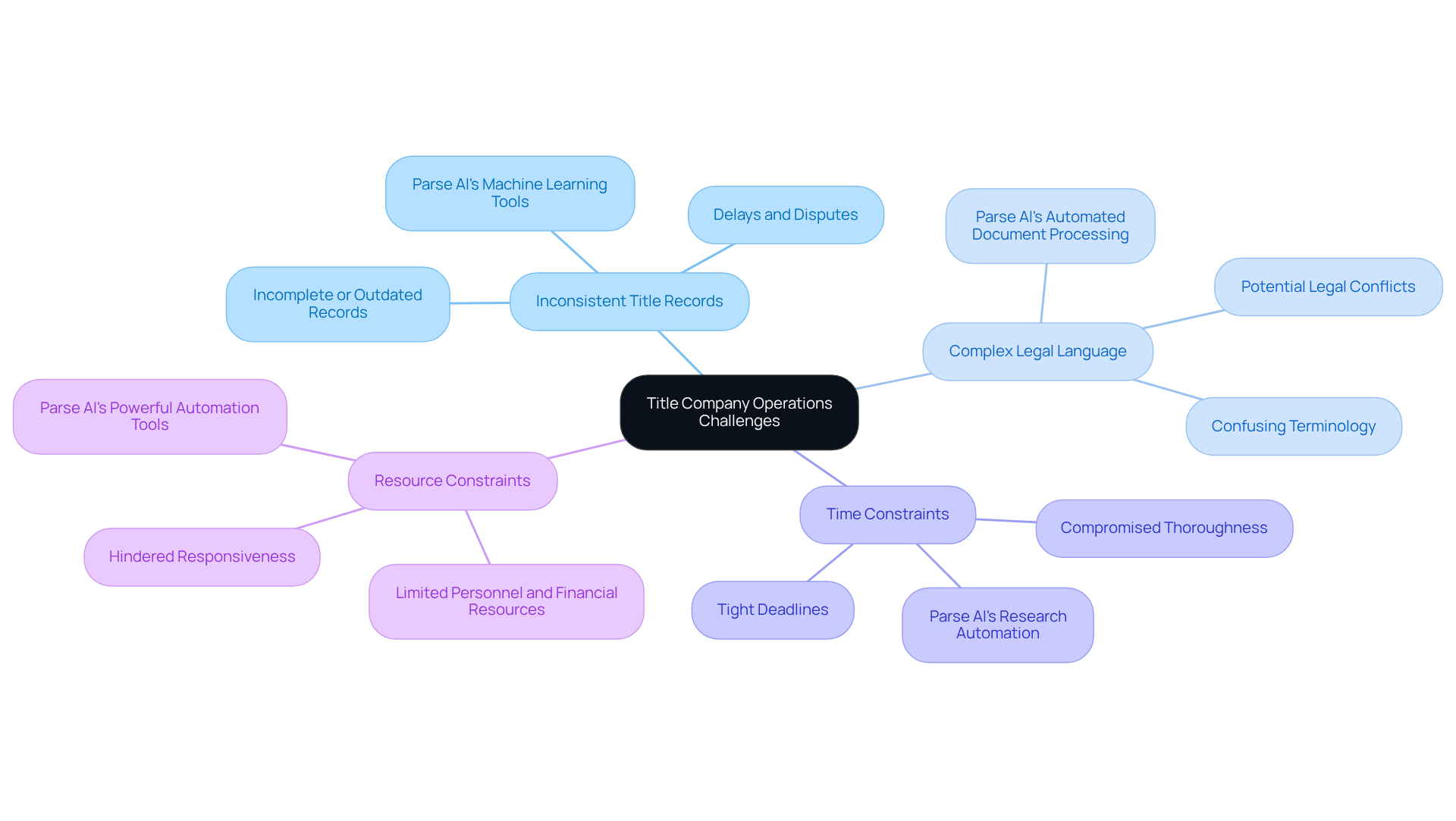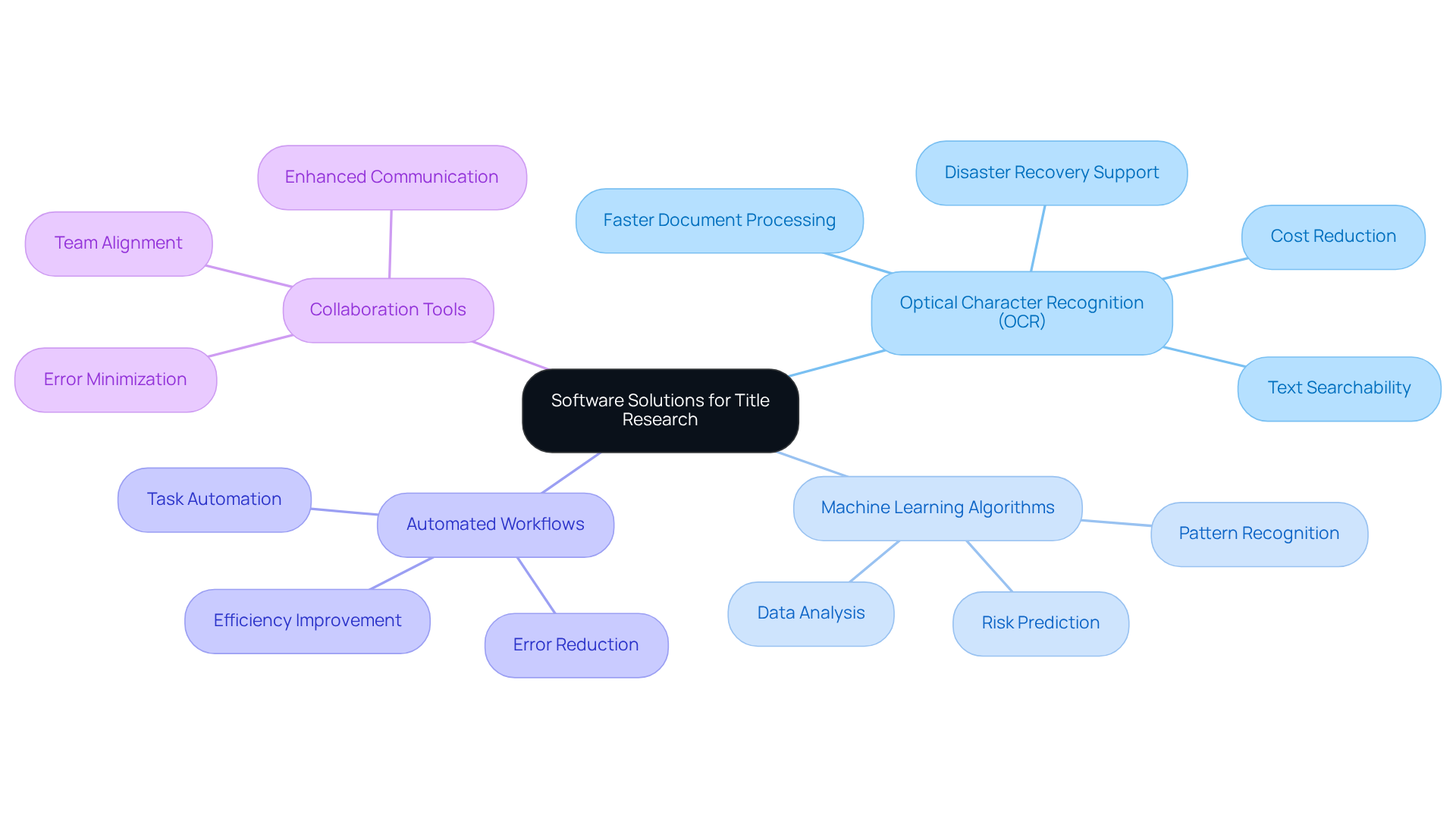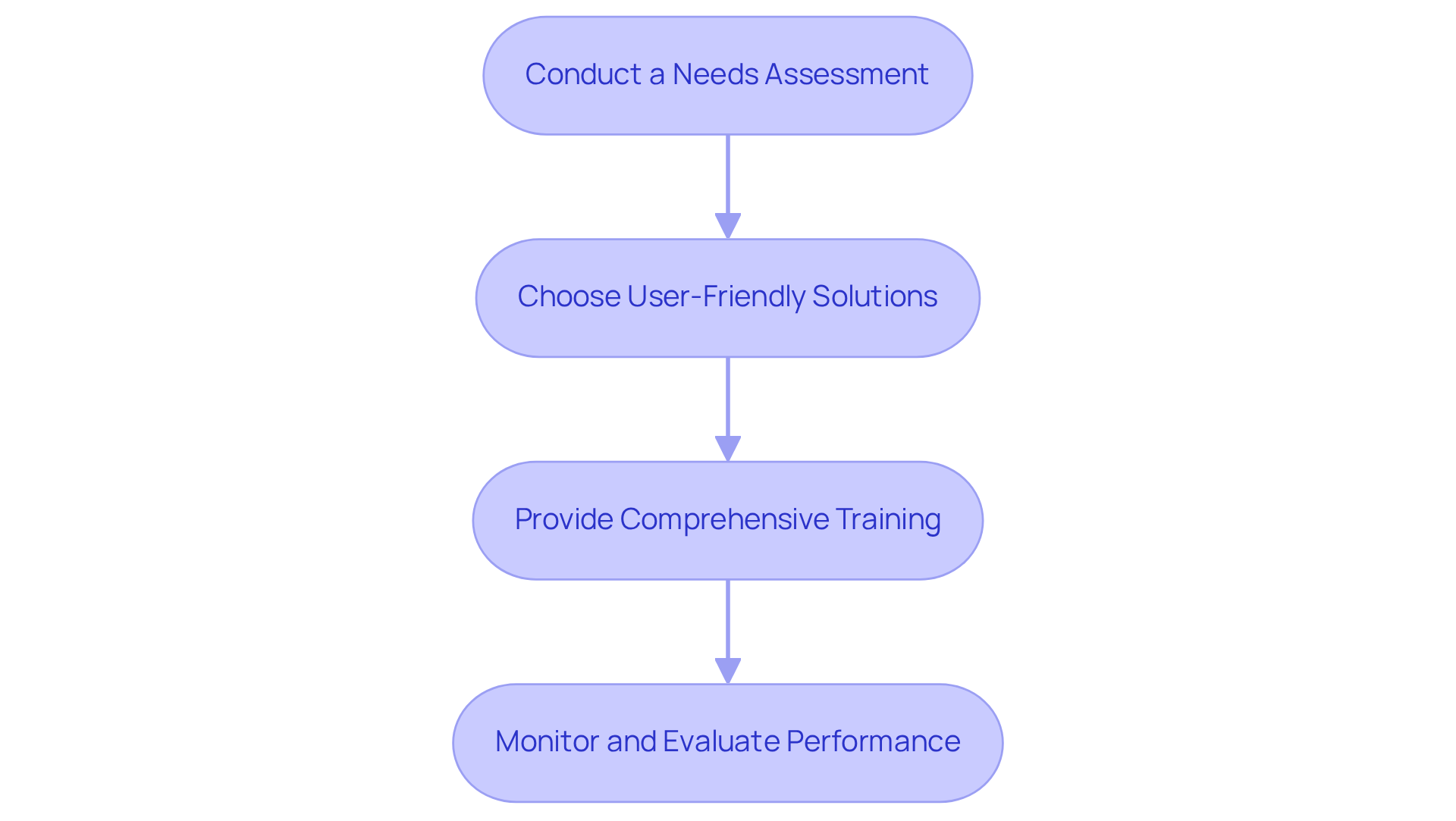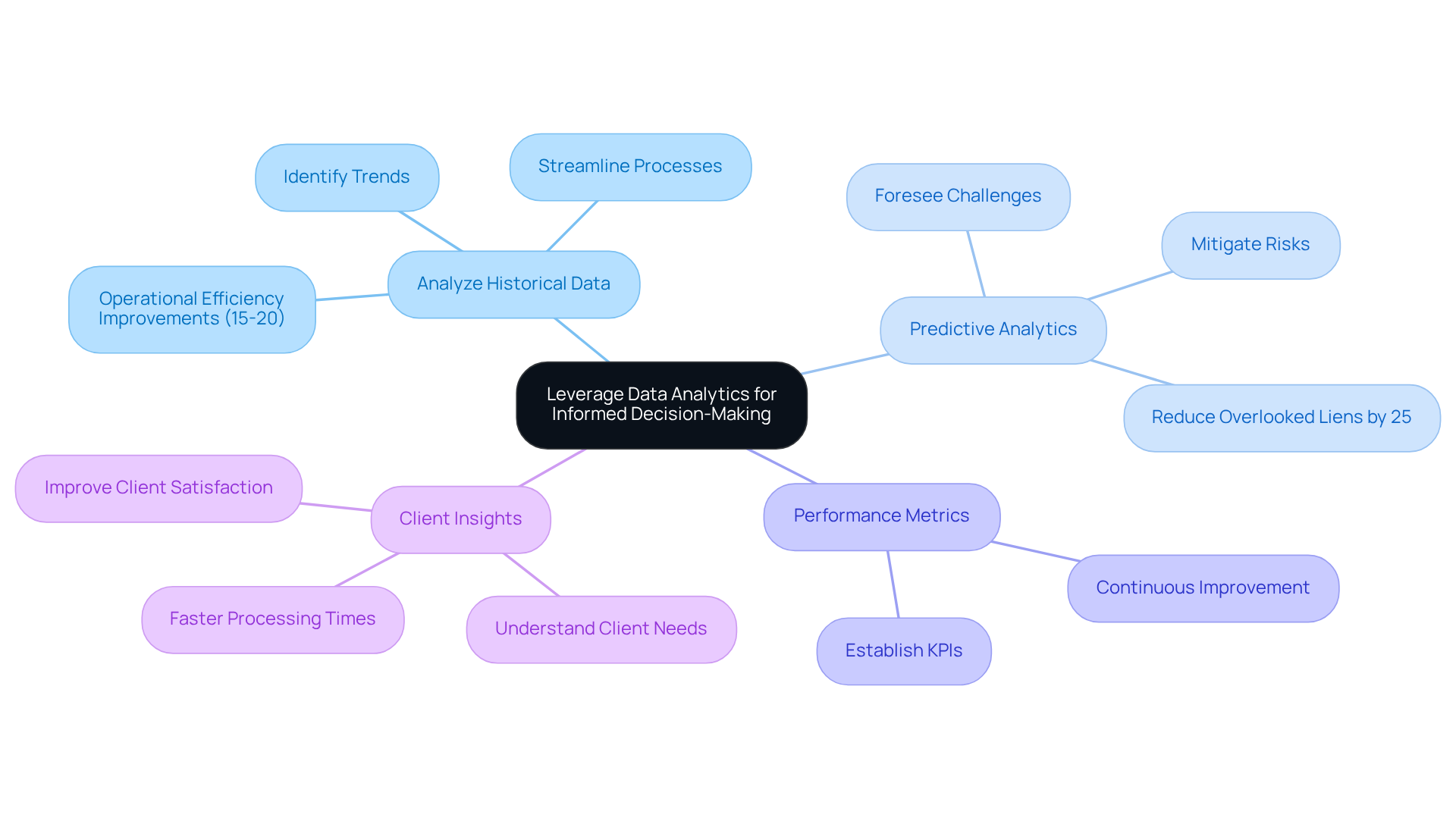Overview
The article underscores the pivotal role of software in enhancing the efficiency and accuracy of title company operations, particularly in the face of challenges such as inconsistent records and complex legal language. By harnessing technologies like machine learning and automated workflows, firms can optimize their processes and improve data management. Consequently, they are positioned to deliver superior service to clients. This is evidenced by the substantial operational improvements reported by companies that have embraced these innovative solutions.
Introduction
The intricate world of title companies is pivotal in ensuring seamless property transactions. However, it is fraught with challenges that can hinder efficiency and accuracy. As these organizations grapple with:
- Inconsistent records
- Complex legal jargon
- Time constraints
the integration of advanced software solutions emerges as a beacon of hope. How can technology not only address these pressing issues but also revolutionize the way title research is conducted? Ultimately, this transformation enhances client satisfaction and trust.
Explore Title Company Operations and Their Challenges
Organizations specializing in property transactions play a crucial role by ensuring that ownership documents are clear and free of encumbrances. However, they face numerous challenges, including:
- Inconsistent Title Records: Many title companies deal with incomplete or outdated records, making it difficult to verify ownership accurately. This inconsistency can lead to delays and disputes in real estate transactions, ultimately affecting client trust and satisfaction. Parse AI's advanced machine learning tools can accelerate processing of files, allowing researchers to swiftly annotate and extract information from unstructured materials, thereby enhancing record accuracy.
- Complex Legal Language: The legal terminology in ownership papers can be confusing, leading to misunderstandings that may influence transactions. Expert opinions stress that uncertainty in ownership records can lead to expensive legal conflicts, underscoring the significance of precise property documentation. With Parse AI's automated document processing, firms can leverage features like OCR technology and interactive labeling to enhance understanding and clarity in legal documents.
- Time Constraints: Title researchers often work under tight deadlines, which can compromise the thoroughness of their work. The urgency to produce outcomes swiftly may result in oversights that could compromise the integrity of the designation. Parse AI's research automation capabilities facilitate quicker completion of abstracts and reports, enabling researchers to meet deadlines without compromising quality.
- Resource Constraints: Numerous organizations face restricted personnel and financial limitations, obstructing their capacity to perform thorough searches. This limitation can hinder their responsiveness to market demands and client expectations. By utilizing Parse AI's powerful automation tools, including the example manager for annotating documents, companies specializing in real estate can optimize their resources and enhance operational efficiency.
Furthermore, the property sector is facing substantial economic challenges, as elevated interest rates and inflation are decreasing mortgage origination volumes. Acknowledging these challenges highlights the need for creative software solutions such as those provided by Parse AI that improve efficiency and precision in research. By utilizing advanced technologies, including automated searches and machine learning extraction, firms can streamline their operations, enhance record accuracy, and highlight the role of software in title company operations to ultimately offer improved service to their clients. Furthermore, as cyber threats become increasingly sophisticated, robust cybersecurity measures will be essential for protecting sensitive information and maintaining client trust. By tackling these challenges through technology, firms in the sector can better navigate the complexities of the evolving real estate landscape.

Utilize Software Solutions to Streamline Title Research
The role of software in title company operations has fundamentally transformed the operations of real estate firms, equipping them with tools that significantly enhance research effectiveness. The importance of accurate title research cannot be overstated, as it forms the backbone of informed decision-making in real estate transactions. However, challenges such as inefficient document processing and data management persist. To address these issues, several key software functionalities can streamline operations:
- Optical Character Recognition (OCR): This technology empowers title researchers to convert scanned documents into editable and searchable text, facilitating the extraction of relevant information from extensive title documents.
- Machine Learning Algorithms: These algorithms analyze historical data to identify patterns and predict potential issues, enabling researchers to concentrate on high-risk areas during their investigations.
- Automated Workflows: Software solutions can automate repetitive tasks, such as data entry and document management, allowing researchers to focus on more complex aspects of verification.
- Collaboration Tools: Various applications enhance communication and teamwork among group members, ensuring alignment and minimizing the risk of errors.
By integrating these digital solutions, firms can enhance their operational efficiency and improve the precision of their research, highlighting the role of software in title company operations to ultimately deliver superior service to their clients.

Implement Best Practices for Software Integration
To effectively integrate software solutions into title company operations, it is essential to follow these best practices:
-
Conduct a Needs Assessment: Prior to selecting software, assess the specific requirements of your title research team. Identify existing pain points and areas where efficiency can be enhanced. This process not only clarifies what needs to be solved but also highlights the most significant opportunity gaps. A needs assessment can lead to more efficient processes and better resource allocation.
-
Choose User-Friendly Solutions: Select applications that are intuitive and easy to navigate. User-friendly solutions minimize the learning curve for staff, fostering quicker adoption and reducing resistance to change. For example, using an integrated CRM with Qualia Resware can boost monthly closings by more than 40%, showcasing the potential advantages of efficient system integration.
-
Provide Comprehensive Training: Ensure that all team members receive extensive training on the new program. Empowering staff with the knowledge and skills to utilize the tools effectively boosts confidence and enhances overall productivity. As Richard Branson stated, "Train people well enough so they can leave. Treat them well enough so they don't want to," highlighting the importance of investing in employee training.
-
Monitor and Evaluate Performance: After implementation, continuously assess the system's impact on operations. Regularly gather user feedback and make necessary adjustments to optimize performance. This iterative method guarantees that the system continues to meet the evolving needs of the team. For instance, Parse AI has transformed research by offering substantial cost reductions in comparison to conventional approaches, highlighting the advantages of continuous assessment and adjustment.
By following these best practices, firms can significantly improve their workflows, thereby enhancing the role of software in title company operations to produce the desired benefits and contribute to operational efficiency.

Leverage Data Analytics for Informed Decision-Making
Data analytics can significantly enhance the decision-making capabilities of real estate firms. Here’s how to leverage data effectively:
-
Analyze Historical Data: Employ analytics tools to scrutinize past title research outcomes. By identifying trends and common issues, organizations can inform future investigations and streamline their processes. For instance, firms that have implemented advanced analytics report operational efficiency improvements of 15-20%.
-
Predictive Analytics: Utilize predictive analytics to foresee potential challenges in document verification. This proactive approach enables organizations to mitigate risks before they escalate into major issues, thus enhancing overall operational efficiency. A notable case is a firm that reduced overlooked liens by 25% over six months through advanced trend analysis.
-
Performance Metrics: Establish key performance indicators (KPIs) to evaluate the effectiveness of research processes. Regularly reviewing these metrics aids in identifying areas for improvement, ensuring continuous enhancement of service quality.
-
Client Insights: Analyze client data to gain a deeper understanding of their needs and preferences. This information can guide service offerings, resulting in improved client satisfaction and loyalty. According to Sunshine Title Solutions, integrating AI has led to faster processing times and enhanced accuracy, translating into smoother transactions and greater confidence in the system.
By incorporating data analytics into their operations, title companies can better appreciate the role of software in title company operations, enabling them to make more informed decisions that ultimately enhance efficiency and improve client service.

Conclusion
The integration of software solutions into title company operations has become essential for enhancing efficiency and accuracy in the real estate sector. By leveraging advanced technologies, title companies can overcome significant challenges such as inconsistent title records, complex legal language, and resource constraints. These innovations not only streamline processes but also build trust with clients through improved service delivery.
Key insights from the discussion underscore the transformative impact of tools like:
- Optical character recognition
- Machine learning algorithms
- Automated workflows
These technologies facilitate better document management, enhance collaboration, and ultimately lead to more informed decision-making. Furthermore, the implementation of best practices in software integration ensures that firms can adapt to evolving needs while continuously improving their operations.
As the real estate landscape becomes increasingly competitive and complex, embracing software solutions is no longer optional but a necessity. Companies that proactively adopt these technologies will not only navigate current challenges effectively but will also position themselves for future success. The call to action is clear: invest in the right software tools to enhance title research, streamline operations, and ultimately provide superior service to clients in an ever-changing market.
Frequently Asked Questions
What is the primary role of title companies in property transactions?
Title companies ensure that ownership documents are clear and free of encumbrances, playing a crucial role in property transactions.
What challenges do title companies face regarding title records?
Title companies often deal with inconsistent, incomplete, or outdated records, making it difficult to verify ownership accurately, which can lead to delays and disputes in real estate transactions.
How does Parse AI help improve record accuracy for title companies?
Parse AI's advanced machine learning tools accelerate the processing of files, allowing researchers to swiftly annotate and extract information from unstructured materials, thereby enhancing record accuracy.
What issues arise from complex legal language in ownership documents?
The confusing legal terminology can lead to misunderstandings that may influence transactions, potentially resulting in expensive legal conflicts due to uncertainty in ownership records.
How can Parse AI assist with understanding legal documents?
Parse AI offers automated document processing features like OCR technology and interactive labeling to enhance understanding and clarity in legal documents.
What impact do time constraints have on title researchers?
Title researchers often work under tight deadlines, which can compromise the thoroughness of their work and lead to oversights that affect the integrity of property designations.
In what way does Parse AI address time constraints for title researchers?
Parse AI's research automation capabilities facilitate quicker completion of abstracts and reports, enabling researchers to meet deadlines without compromising quality.
What resource constraints do title companies face?
Many organizations experience limited personnel and financial resources, which can hinder their ability to perform thorough searches and respond to market demands.
How can Parse AI optimize resources for title companies?
By utilizing Parse AI's powerful automation tools, including the example manager for annotating documents, companies can enhance operational efficiency and optimize their resources.
What economic challenges is the property sector currently facing?
The property sector is experiencing economic challenges due to elevated interest rates and inflation, which are decreasing mortgage origination volumes.
How can technology help title companies navigate these challenges?
Creative software solutions like those provided by Parse AI can improve efficiency and precision in research, streamline operations, and enhance record accuracy.
Why are cybersecurity measures important for title companies?
As cyber threats become more sophisticated, robust cybersecurity measures are essential for protecting sensitive information and maintaining client trust in the real estate sector.




